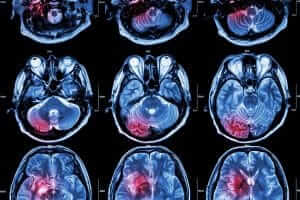How Accidents Can Cause Traumatic Brain Injuries

What is a traumatic brain injury?
The term traumatic brain injury (TBI) describes a wide variety of injuries that can happen to the brain. The damage can either be limited to one area of the brain (focal) or can affect more than one area (diffuse). In addition, the severity of a brain injury can vary from a mild concussion to a severe injury that leads to a coma or death.
There are generally two types of TBI:
- Closed – brain injuries that do not break the skull and are caused by a swift movement of the brain inside the skull that leads to brain tissue and blood vessel damage. Car accidents, falls, and sports accidents are common causes of closed brain injuries.
- Penetrating – severe brain injuries that cause a break in the skull, such as a bullet penetrating the skull and harming the brain. Although less common than closed brain injuries, penetrating brain injuries often result in a worse prognosis.
According to a report by the U.S. Centers for Disease Control and Prevention (CDC), “nationally 60,565 TBI-related deaths occurred during 2018 and 60,611 during 2019.”
What are the symptoms of TBI?
A TBI can lead to many physical and psychological symptoms, some appearing immediately and others becoming apparent days or weeks after the injury. While some traumatic brain injuries are mild and affect the brain temporarily, others that are more severe may result in long-term complications. Some of the signs of a mild TBI include:
| · Loss of consciousness for up to a few minutes
· Disorientation or confusion · Headaches · Nausea or vomiting · Drowsiness or fatigue · Speech, memory, or concentration problems · Dizziness or balance issues |
· Mood swings
· Anxiety or depression · Blurred vision · Ringing in the ears · Changes in the ability to smell or taste · Sensitivity to light or sound · Sleep issues |
A moderate to severe TBI might include any of the symptoms of a mild injury, as well as the following:
| · Loss of consciousness from several minutes to hours
· Persistent headaches that worsen · Continual vomiting or nausea · Seizures or convulsions · Dilation of one or both pupils · Clear drainage from the nose or ears |
· Inability to awaken from sleep
· Numbness or weakness in the fingers and toes · Lack of coordination · Increased unusual behaviors, including confusion, agitation, or combativeness · Slurred speech · Coma |
Although children suffering from TBI are often unable to communicate headaches, sensory issues, confusion, and other symptoms, they sometimes display the following:
- Changes in eating and sleeping habits
- Unusual irritability
- Persistent crying
- Inattentiveness
- Seizures
- Sadness
- Increased drowsiness
- Disinterest in toys or activities
Those who experience a blow to the head that causes behavior changes or symptoms of TBI should seek medical care immediately, and even a mild brain injury requires prompt attention.
What types of Houston accidents can cause a brain injury?
About 1.7 million Americans suffer TBIs, with researchers stating that “adolescents between ages 15 and 19 and adults age 65 and older among the most likely to sustain a traumatic brain injury.” The Texas Traumatic Brain Injury Advisory Council and Texas Department of Health and Human Services estimate that approximately 144,000 Texans sustain a TBI every year, every 30 minutes a Texan is hospitalized with a TBI, and nearly half a million Texans live with a permanent disability caused by a TBI.
- Car accidents. The primary cause of TBI resulting from a car accident is a sudden blow to the head, as when a crash victim forcefully collides with the steering wheel, the dashboard, or the windshield during an accident. The initial injury causes bruising, bleeding, and tearing of brain tissue, and a secondary injury occurs when the brain swells and limits blood flow to the brain.
- Truck accidents. Accidents involving trucks frequently result in severe injury due to the large size and weight of commercial vehicles. The force of a truck accident can cause the truck’s occupants or another vehicle to strike their heads on dashboards, seats, and windows. This impact can lead to severe damage to the skull, resulting in a TBI.
- Motorcycle accidents. According to Syracuse University research, approximately 37 percent of all fatal motorcycle crashes involve head injuries. When a motorcyclist involved in an accident strikes their head on a roadway, a traumatic brain injury is frequently the result.
- Bicycle accidents. Between 2009 and 2018, an estimated 596,972 bicyclists visited emergency departments in the US to seek treatment for a TBI. At least partly due to its increase in popularity, bicycling leads to the highest number of sport and recreation-related emergency room visits each year.
- Uber & Lyft accidents. In 2017, an Uber passenger sustained a TBI in a ride from a Rhode Island airport to his hotel and filed a lawsuit against the company. Rideshare drivers are frequently involved in accidents because they can become distracted due to GPS navigation. In addition, they are typically not specially trained by their companies, often work long hours, and many have more than one job.
- Pedestrian accidents. Pedestrian accidents are frequently catastrophic. For example, in a pedestrian crash, a pedestrian’s head might strike the pavement or get hit by a vehicle, causing the brain to be pushed back and forth against the skull and resulting in a TBI.
According to recent research published in the journal Brain Communications, severe TBI is more common in the occupants of vehicles that are involved in side-impact collisions.
If you or someone you love sustained a TBI due to another party’s negligence, the personal injury attorneys at the Kishinevsky Law firm will help you recover fair compensation for your damages. Call our Houston office at 832-529-1111 or fill out our contact form to set up your free initial consultation to speak with a Houston brain injury attorney today.

In April 2015, Leonid Kishinevsky started the Kishinevsky Law Firm, focusing his practice primarily on personal injury litigation. As a personal injury lawyer providing representation to clients throughout the greater Houston area, he assists people who have suffered economic and noneconomic losses and harms due to the fault of other people or companies.
